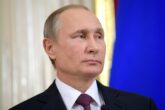March 01, 2020
The Building Blocks of a Progressive Transatlantic Vision
As the US presidential elections in November 2019 quickly approach, transatlanticists in the United States and Europe are trying to decipher what the next four years may bring for the US-European partnership. A second term for Donald Trump means that the difficulties that have plagued the relationship for the last three years will almost certainly continue. A Democrat entering office, on the other hand, could provide an opportunity for a clean slate. No matter who ultimately claims victory at the polls, one thing is certain: The US-European relationship needs a makeover; a progressive vision that places new priorities at the forefront of transatlantic cooperation; one that lays the foundation for the two sides to jointly tackle the most important issues of our time. But what exactly, would this vision look like?
First and foremost, a progressive vision means elevating the status of the US-European Union (EU) relationship. For decades, the foundation of the US-European partnership has been the NATO alliance, which has over-militarized transatlantic relations and prioritized a narrow vision of security and defense. The two sides often get sidetracked debating issues like European defense spending and how to counter Russia. While these issues are important, they are by no means the most important. There other aspects of today's geopolitical landscape that will prove to be more consequential in the years to come; issues that NATO does not exist to tackle, and which, instead, will require deeper and more meaningful cooperation between the US and the EU. At the top of the list are climate change, a rising China, and a recommitment to human rights.
Read the full essay in the Heinrich Böll Foundation's Multilateralism 2.0 compendium.
More from CNAS
-
The Eurasian Century: Hot Wars, Cold Wars, and the Making of the Modern World with Hal Brands
For more than 100 years, the continent of Eurasia has played a central role in global geopolitics. In the 20th century, numerous authoritarian powers from Germany under Kaiser...
By Andrea Kendall-Taylor, Jim Townsend & Hal Brands
-
Putin’s Fight Won’t End With Ukraine
In an essay for Foreign Affairs, titled “Putin’s Point of No Return,” Andrea Kendall-Taylor, senior fellow and director of the Transatlantic Security Program at the Center for...
By Andrea Kendall-Taylor
-
Trump’s Callout of Russia’s Vladimir Putin Is Raising Eyebrows
President Trump is threatening sanctions and tariffs on Russia if Putin doesn't reach an agreement to end the war in Ukraine. Some are surprised, considering Trump's affinity ...
By Andrea Kendall-Taylor
-
In Russia's Perceived War with the West, Arms Control is Collateral Damage
Russia seemingly perceives previously established arms control agreements as elements of the broader Western-dominated political and security order that it aims to overturn....
By Nicholas Lokker




